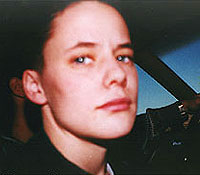Brandon Teena
| Brandon Teena | |
|---|---|
 |
|
| Born |
Teena Renae Brandon December 12, 1972 Lincoln, Nebraska |
| Died | December 31, 1993 (aged 21) Humboldt, Nebraska |
| Cause of death | Murder by gunshot |
| Resting place | Lincoln Memorial Park, Nebraska |
| Nationality | American |
| Other names | Billy Brinson Teena Ray |
| Known for | Hate crime murder victim |
| Parent(s) | Patrick and JoAnn Brandon |
Brandon Teena (December 12, 1972 – December 31, 1993) was an American trans man who was raped and murdered in Humboldt, Nebraska. His life and death were the subject of the Academy Award-winning 1999 film Boys Don't Cry, which was partially based on the 1998 documentary film The Brandon Teena Story. Both films also illustrated that legal and medical discrimination contributed to Teena's violent death.
Teena's murder, along with that of Matthew Shepard, led to increased lobbying for hate crime laws in the United States.
Brandon was born Teena Renae Brandon in Lincoln, Nebraska, the younger of two children of Patrick (1952–1972) and JoAnn Brandon. His father died in a car accident eight months before he was born, and he was raised by his mother. JoAnn named him, her second child, after their German shepherd dog, Tina Marie. Teena and his older sister Tammy lived with their maternal grandmother in Lincoln, before they were reclaimed by their mother when Teena was three years old and Tammy was six. The family resided in the Pine Acre Mobile Home Park in northeast Lincoln, and JoAnn worked as a clerk in a women's retail store in Lincoln to support the family. As young children, Teena and Tammy were sexually abused by their uncle for several years, and Teena sought counseling for this in 1991. JoAnn remarried once from 1975 to 1980, with the marriage failing due to her husband's alcoholism. Teena's family described him as being a tomboy since early childhood; Teena began identifying as male during adolescence and dated a female student during this period. His mother rejected his male identity and continued referring to him as her daughter. On several occasions, Teena claimed to be intersex though this assertion was later disproved.
Teena and his sister attended St. Mary's Elementary School and Pius X High School in Lincoln, where Teena was remembered by some as being socially awkward. During his second year, Teena rejected Christianity after he protested to a priest at Pius X regarding Christian views on abstinence and homosexuality. He also began rebelling at school by violating the school dress-code policy to dress in a more masculine fashion. During the first semester of his senior year, a U.S. Army recruiter visited the high school, encouraging students to enlist in the armed forces. Teena enlisted in the United States Army shortly after his eighteenth birthday, and hoped to serve a tour of duty in Operation Desert Shield. However, he failed the written entrance exam by listing his sex as male.
...
Wikipedia
